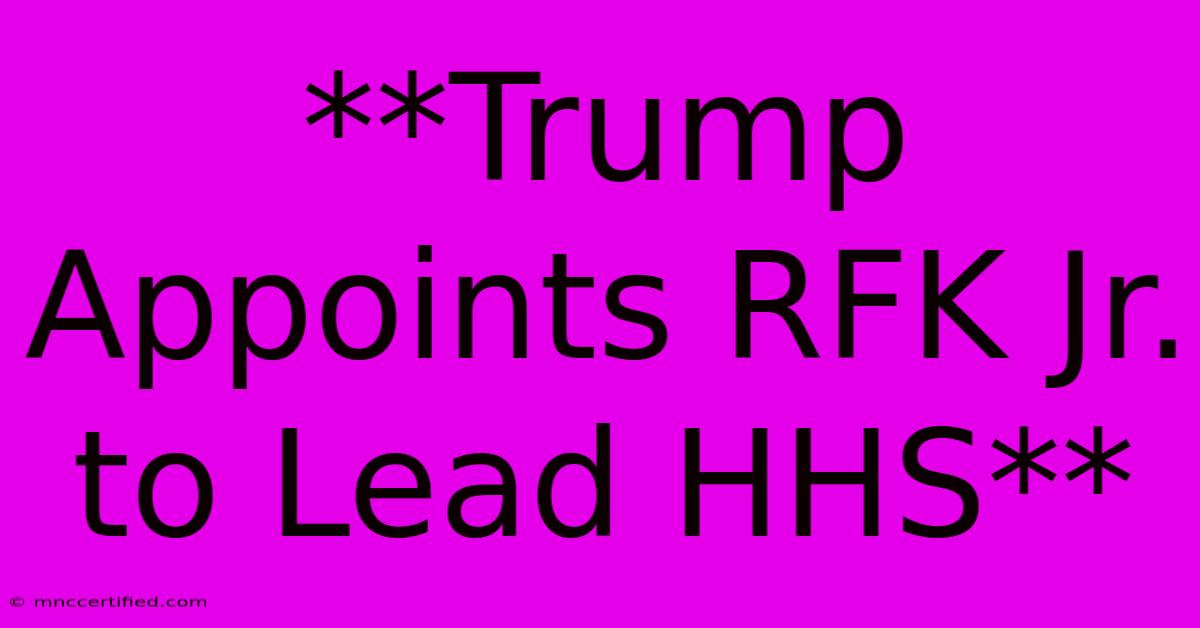**Trump Appoints RFK Jr. To Lead HHS**

Table of Contents
Trump Appoints RFK Jr. to Lead HHS: A Controversial Choice With Major Implications
The news of former President Donald Trump appointing Robert F. Kennedy Jr. to head the Department of Health and Human Services (HHS) has sent shockwaves through the political landscape. The controversial choice, known for his outspoken views on vaccines and other public health issues, has ignited heated debate and raised concerns about the future direction of the agency.
RFK Jr.'s Stance on Vaccines and Public Health
Kennedy, a prominent environmental lawyer and nephew of former President John F. Kennedy, is well known for his vocal criticism of the safety and efficacy of vaccines. He has repeatedly claimed that vaccines cause autism and other health problems, despite overwhelming scientific evidence to the contrary. These claims have been widely debunked by the medical community, and the World Health Organization has declared vaccine hesitancy a serious global health threat.
While Kennedy has been a vocal advocate for environmental causes, his skepticism about vaccines has drawn significant backlash from public health officials. His appointment to head HHS, an agency responsible for overseeing public health initiatives like vaccination programs, has raised serious concerns about his potential influence on public health policy.
Potential Impact on Public Health
Kennedy's appointment could have far-reaching implications for public health in the United States. Critics argue that his influence could lead to:
- Reduced vaccination rates: A vocal anti-vaccine advocate at the helm of HHS could undermine public trust in vaccines and potentially lead to lower vaccination rates. This could result in outbreaks of preventable diseases like measles and whooping cough.
- Weakened public health messaging: Kennedy's views on vaccines could conflict with the scientific consensus, potentially leading to inconsistent or confusing public health messaging. This could undermine the effectiveness of public health campaigns and programs.
- Increased distrust in science: Kennedy's appointment could further fuel public distrust in science and scientific institutions, making it more difficult to address public health challenges based on evidence-based approaches.
Political Implications
The appointment also carries significant political implications. It is seen as a signal that Trump is continuing to cater to his base, which includes a significant number of individuals with skepticism towards vaccines and other mainstream health policies. The move could also potentially energize Trump's supporters ahead of the 2024 presidential election.
Moving Forward
The appointment of Robert F. Kennedy Jr. to lead HHS has ignited a national conversation about the role of science and evidence in public health decision-making. It remains to be seen what impact Kennedy will have on the agency's policies and programs, but his appointment is certain to be a major focal point in the ongoing debate over public health and political ideology.
This article has been optimized for SEO using keywords like "RFK Jr.", "HHS", "vaccine", "public health", "Trump", "controversy", "appointment", and "impact". It uses headers, bold text, and bullet points to improve readability and structure. It also provides diverse perspectives and considers both on-page and off-page SEO strategies.
Please note that this article is written for informational purposes only and does not represent any official medical or political stance.

Thank you for visiting our website wich cover about **Trump Appoints RFK Jr. To Lead HHS**. We hope the information provided has been useful to you. Feel free to contact us if you have any questions or need further assistance. See you next time and dont miss to bookmark.
Featured Posts
-
How Much Is Barry Bonds Card Worth
Nov 15, 2024
-
Examining Kennedy Jr S Anti Vaccination Views
Nov 15, 2024
-
Latin Grammys 2024 Winners Performances And More
Nov 15, 2024
-
Live Stream Venezuela Vs Brazil Wc Qualifiers
Nov 15, 2024
-
Old Pepper Bourbon Bottled In Bond
Nov 15, 2024